#henry crawford
Text



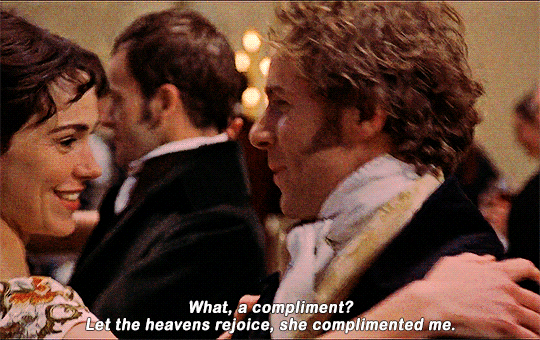
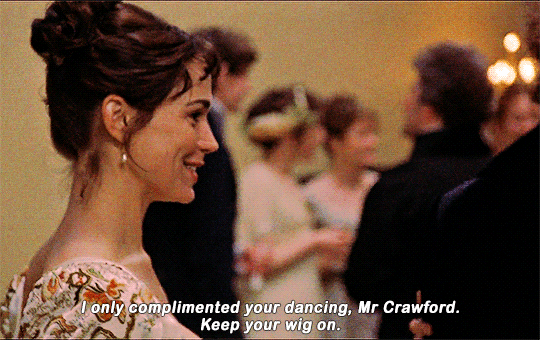
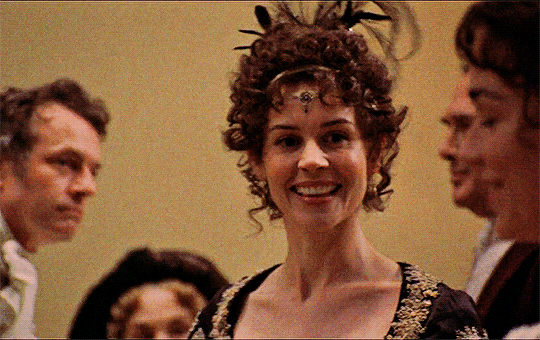
...he had once seen Fanny dance; and it was equally true that he would now have answered for her gliding about with quiet, light elegance, and in admirable time. -Mansfield Park, Chapter 6, Vol. II / Mansfield Park 1999
#filmedit#austenedit#mansfield park#patricia rozema#perioddramaedit#perioddramacentral#perioddramasource#jane austen#henry crawford#fanny price#mary crawford#fanny x henry#henry crawford x fanny price#this scene this convo this dance this soundtrack!!!!#I love how she's barely civil to him and he just loses it lmfao#also the fact that they both have a bad case of heart eyes going on#mine
167 notes
·
View notes
Text
Writing Villains (Advice from Jane Austen)
One of the reasons that I find Jane Austen's novels so wonderful is that they have amazingly realistic villains, some that are fully fleshed out characters. Austen's biggest strength is that she gives her villains clear, logical motives. In fact, for many of her villainous characters you can turn the entire story around and see a rational story from the other side.
For example, Lucy Steele. She doesn't attack Elinor out of mindless evil, but because Edward Ferrars is her golden ticket to wealth and she knows that Edward loves Elinor. Lucy might twist the knife a little on Elinor out of sadism, but generally she attacks Elinor in an attempt to secure Edward. When it comes to other characters, Lucy is overly sweet if she wants something from them, otherwise she acts normally. As an example, she leaves Marianne alone because Marianne is not competing for Edward and also can't do anything for Lucy. Anne, Lucy's sister, likes her. Lucy has friends and family she stays with, she's a fairly well-rounded person.
You can put yourself in Lucy's shoes, you can turn the entire narrative on it's head and play it out from her perspective and it would make complete sense. You could even make Lucy sympathetic! She probably sees herself as a hardworking underdog, trying to wrest her one chance at prosperity away from the conniving Elinor Dashwood. I'm sure she thinks the pain she causes Elinor is justified.
If you can't do that with your villains, then there is a good chance they are just evil for evil's sake. I picked Lucy Steele on purpose because I hate when the entire motivation for a antagonist female character is "bitches be crazy". Bitches may be mean, but almost always for a good reason.
Even Mrs. Norris, who is probably the most cruel of Austen's female villains, can be perspective switched. Her life is about being useful to the Bertram family so she can feel important because her married status/wealth is lower than she wished. As she must always be deferential towards the Bertrams, she takes out her negative emotions on those below her, the servants and Fanny, while also showing off how good she is at "managing" those people. (And yes, she is your childhood bully)
We often hear her perspective and she clearly sees herself as a useful part of the family and a defender of Sir Thomas's wealth. She thinks she's a good person! Which is also an important point: most people doing wrong do not believe that they are doing wrong. That is what really makes a villain scary. Mrs. Norris thinks she's helping Fanny in a very twisted way by teaching Fanny her station in life. If you asked her, she'd give you a self-justified answer and she'd probably actually believe it.
Another way to do a good villain is to just make a person very selfish. Henry Crawford doesn't sit around all day laughing about how much pain he causes women, he doesn't think about it. He only thinks about the fun of flirting for himself, not the harm to others. The glimpses we get into her perspective are not cruel at all. It's the same with Willougby, he thinks only of his own pleasure and tries very hard to ignore that he has crushed Marianne and destroyed Eliza Williams. When he is forced to accept that people were hurt, he blames everyone but himself.
Wickham thinks that he's a victim, Caroline Bingley is ambitious and doesn't care who she steps on to get to the top, Mr. Elton is insulted that Emma could even dream he's a match with Harriet but he can't touch Emma so he punches down at Harriet. They all make sense, they all probably believe that their actions are justified.
Also, imagine taking the heroine/hero right out of the story, would the villain still act the same way? If Anne didn't exist, Mr. Elliot would still try to bring himself into the Elliot family because he was afraid of losing the title. If Elizabeth didn't exist, Wickham would have had another favourite in Meryton. If Fanny didn't exist, Mrs. Norris would have found some other puppy to kick. The villains don't just appear for the plot of the main characters, they have their own reasons for moving around and messing shit up.
Lastly, explaining but not excusing (though unfortunately some people will excuse anyway but that's not your fault). Mary Crawford is mercenary and doesn't seem to believe that love is even a real thing. It's pointed out several times in the novel that her defects have to do with being raised in an immoral environment and a broken home. She was taught by her aunt to marry for wealth and disregard love. Austen doesn't excuse Mary, she doesn't give her a happy ending, but she does explain how she came to be. She's not just greedy, she has been taught that wealth is the best recipe for happiness. As an adult now, it is her responsibility to question that maxim or remain a villain.
Austen wrote amazing morally grey characters and "villains" (a term I used a little liberally here, some of them probably only count as antagonists, not full blown villains). I love how real and human she made her characters, it's something I aspire to myself!
Linking my Caroline rant because it's related, people remove her motives so often and flatten her into a "bitches be crazy".
#jane austen#villains#avoiding “bitches be crazy”#Lucy steele#mrs. norris#mansfield park#sense and sensibility#henry crawford#mary crawford
272 notes
·
View notes
Text
It is no secret that I hate the Fanny/Henry pairing, bc like...
How can you read that book, and how Henry acts, and the distress it causes Fanny while we're in her head the whole way through...
And want her to be wrong? And want her to be the one to have to admit she was wrong?
No! Terrible, awful ending. Henry Crawford is not a good person. He's not, like, evil. But he's selfish and self-centred and thinks he deserves Fanny because he's rich and charming and made the bare minimum effort to seem like a better person. I fully buy into the idea that he likes her because he likes a challenge, and that if finally faced with what she like every day (shy and retiring and quiet and uncomfortable around loads of ppl) he'd start to resent her sharpish.
This is a book about selfishness and selfish people, and even in this cast, he's near the top of the most selfish, the most careless with the feelings of others. At the centre is Fanny, who is maligned and mistreated, but despite all is selfless and good, though she struggles with jealousy and negative thoughts and feelings.
It's a book about how she - poor and dependent and not especially well educated or taken care of by her relatives - knows her own mind and deserves to be treated as a rational, intelligent person.
It is literally crucial to her arc and the arc of the story that she's right about Crawford!
#fanny price#mansfield park#henry crawford#ive started to just think of it as kind of misogynistic#to be like ugh why won't she just marry Henry#like she's being irrational#you are literally sir thomas bertram (derogatory) sorry#anti henry crawford#i don't actually think it is but I'm going to tag just in case#anti fanny/henry
166 notes
·
View notes
Text
Fanny Price: I can't fix him
102 notes
·
View notes
Text
Mansfield Park - Henry Crawford and Fanny Price
I want to lay out how I see these characters and their relationship, because to me they seem to be set up as a deliberate contrast to Pride and Prejudice. At the tine of Henry’s first proposal, they are in a similar place to Elizabeth and Darcy at the time of Darcy’s first proposal, albeit with extremely different personalities than those characters: Fanny refuses him despite his wealth and her economic precarity because she cannot like or even respect him. However, Fanny, who is far shyer than Elizabeth, cannot lay out in direct and specific terms the foundation of her disapprobation of him.
From there, Henry sets out to win her regard in ways that very closely recall some of the events between Elizabeth and Darcy.
1) He does a great favour for a relative of hers. In his case, it is getting his uncle the admiral to have Fanny’s brother William promoted to lieutenant; in Darcy’s, it is saving the Bennets from disgrace by getting Wickham to marry Lydia. Darcy’s favour is far greater, and much more personally unpleasant for him, and he keeps it intentionally secret; he does it out of love of Elizabeth, but not to make her feel obligated. Henry’s takes only a few days of his time, its goal is get to Fanny to like him better, and he leverages it both at first and later to make her feel obliged to him.
2) He changes his manners to suit her. In Darcy’s case this means being polite rather than rude and haughty; in the case of Henry, who has always been charming and gregarious, it involves softening his manners to suit Fanny’s shy and quiet personality and engaging in more serious talk. In Darcy’s case this is a fundamental change in response to Elizabeth’s reproof; in Henry’s, it’s a simple adaptation to one person’s taste rather than another. He’s intelligent and able to engage in serious conversation when he wants to, but that’s not indicative of any fundamental change in his thinking.
3) He is polite to her family (the Prices, in Portsmouth) even when they are embarrassing.
4) He speaks with Fanny about reforms he is making on his estates to make sure his tenants are being treated fairly. These feels like a parallel to Elizabeth’s improved opinion of Darcy upon visiting Pemberley and hearing how well his servants speak of him. The difference is that Darcy has always been like that, whereas we are told early in Mansfield Park that Henry has been little on his estates during his adulthood: “To any thing like a permanence of abode, Henry Crawford had…a great dislike”. Darcy is acting in line with deep-seated principles; Henry is doing it as part of his courtship of Fanny, so he can bring it up to her and look good. He also tries to get her to counsel him to continue in this current vein, to engage her in a desire to fix/improve him, which Fanny shuts down laudably: “I advise! - you know very well what is right,” and when he reples that he always knows what is right when she tells him: “We all have a better guide in ourselves, if we would attend to it, than any other person could be.” The weakness of Henry’s motivation is seen in the ending, where he puts off a visit to his estates to set matters right there in order to flirt with the now-married Maria Rushworth.
In short, Darcy is already good in many concrete ways, and sincerely improves in the ways where he is faulty, not in order to get Elizabeth to love him but because he thinks about her criticisms, agrees with them, and wants to be better for its own sake; and he helps her family solely out of love for her and deliberately hides it. Henry changes his manner and talk as part of his courtship, but his deeper values and attitudes do not change, and everything is directed at getting Fanny to fall for him.
The second area of contrast is in what the heroines object to. Elizabeth’s aspersions on Darcy’s character, regarding his interactions with Wickham, are found to be mistaken; her legitimate objections are to his attitude and arrogance, and he amends this. Henry’s manners are impeccable and his company charming; Fanny’s objections are to his character. She sees him deliberately flirt with both her cousins at once to a degree that implies an intent to propose, and play them off against one another; she sees him make some very deliberate and mutually-understood innuendo towards Maria, signifying that she should break off her engagement and be with him instead, all with zero intention of actually proposing if she did do so; she sees him use the theatricals to continue this pursuit of Maria. And this is very usual behaviour for Henry; his sister says he has broken many hearts, and when he starts courting Fanny his goal is to make her fall in love with him and then leave her “feeling she will never be happy again”.
This is what makes me judge Henry much more harshly than his sister Mary. Mary can be selfish, but she is not malicious or cruel, and she can be kind when it doesn’t inconvenience her (and one of her better traits is that even when she is unhappy or disappointed she never takes it out on other people). In contrast, Henry’s principal diversion and entertainment for years has been deliberately making young women miserable, leading them on, getting them to reject other suitors in hopes of him, and then departing without a care, to please his own vanity. He is, in truth, doing not once but habitually, what Willoughby did to Marianne: always implying enough to seem on the edge of an engagement but never following through, and then pretending it was all nothing. It’s a casual cruelty he finds amusing as a proof of his skills. In short, he’s a deceptive playboy. Even after Maria is married, he can’t resist flirting with her, which is what leads to her disgrace and social destruction.
Even though Austen lays out an alternative scenario where Henry might have married Fanny if not for that final flirtation with Maria Rushworth, all of the above does not lead me to believe she find that scenario desirable. She’s painstakingly laid out all the contrasts with her previous novel that make this scenario a very different one from Pride and Prejudice.
In addition to Henry’s serial seductions, one of the biggest red flags is his attempt to make Fanny responsible for his character, with an attitude of ‘you’re such an angel, you can make me do whatever you want’. This gives me Tenant of Wildfell Hall vibes, where Helen’s aunt tries to warn her off thinking that an older man of the world will let himself be guided and led by a younger woman who is in his power. Fanny rejects this idea: Henry knows what is right, can make his own choice to do it, and she will not let herself be appropriated as his conscience. Henry isn’t debauched like Huntington, but if Fanny married him the chances of him feeling bored after some years - when he no longer has the thrill of the pursuit to keep him interested - and pursuing other flirtations and affairs to Fanny’s misery, seems pretty high based on his character; and he’s skilled enough at skirting the line that he could easily brush away any objections from her as “oh, it’s nothing, just being sociable.”
On top of all the faults of character - even if Henry did reform, I have trouble seeing Fanny and Henry being happy together. At the core of his personality is a need for change, for stimulus, for challenge (the latter, rather than sexual desire, is the main thing driving his string of conquests), and for company. Fanny, in contrast, very much prefers quiet and the company of a few people she is close to, and I think this is her genuine personality, not something that needs to be overcome by “bringing her out of her shell”. Henry would be bored to misery living the kind of lifestyle that Fanny is comfortable with, and Fanny would be deeply unhappy living in the social whirl and flurry of activity that Henry prefers. In contrast, Fanny and Edmund are both “me after a quiet day in: time for a quiet night in” people.
So, with all this, why is Henry/Fanny a popular AU? Apart from fannish dislike of Edmund (which I don’t share), I think part of it is that we don’t get an open confrontation between Fanny and Henry, the way we do between Elizabeth and Darcy, where she lays out her objections to him: I saw you flirting with both my cousins at once, I saw you making them both unhappy for your own amusement, I saw you repeatedly tempting Maria to break her engagement with no intention of following through if she did, just because you liked the challenge of winning an engaged woman. And the lack of this naturally raises the question of: how would Henry react if this confrontation happened? Which provides fertile soil for AUs.
175 notes
·
View notes
Text
The thing about the Maria and Henry scandal is that it was so stupidly avoidable. Over and over again, they were given the opportunity to not do what they did. Sir Thomas gave Maria full agency to go back on her engagement when he saw that she didn’t love Rushworth, but she didn’t. Henry didn’t need to go to London and see Maria, but he did. Maria was cold to him because she wanted nothing more to do with him and he didn’t walk away. He pressed on. He didn’t even want to have an affair — he was in love with Fanny! He had exactly zero need to fall in with Maria again and yet he did. And she gave the final push. It’s like a Greek tragedy. At once so avoidable and so unavoidable.
#smashing vases it was the dumbest thing in the history of dumb things#the man already left you once maria!!!#what exactly did you think was going to happen???#lydia bennet at least ran away because she thought she was about to get married#but maria already had a husband so what was even her plan#and don’t get me STARTED on crawford#did he think that he’s somehow still be able to marry fanny after all that??#at what point do you think he realized he’d lost her#mansfield park#henry crawford#maria rushworth#jane austen#elly's posts
59 notes
·
View notes
Text
henry crawford winning me over with his trust fund baby frat boy seducer aura was not on my 2024 bingo card!
#rereading mansfield park#why are red flags so yummy in literature#the way austen describes henry’s infatuation with fanny is so delicious!!#fanny price is my it girl#edmund and fanny are otp#henry crawford#jane austen#fanny price#mansfield park#edmund bertram#mary crawford
74 notes
·
View notes
Text
Henry Crawford is not a good person. And yet what draws him so irresistibly toward Fanny is that she is. He sees that she is kind and patient and good, and - in spite of so many contrary influences in his life - he intuits that goodness' value. And because of that, he falls in love,
Here's the thing. Falling in love with a good person is not the same as being a good person, and I love how Jane Austen recognizes that--I love how that message is highlighted and underlined within the text. But it could be the catalyst for redemption.
Something I've pondering is that, in spite of the ending of Mansfield Park, maybe it still could be. We leave Henry Crawford like this:
All that followed was the result of her imprudence; and he went off with her at last, because he could not help it, regretting Fanny even at the moment, but regretting her infinitely more when all the bustle of the intrigue was over, and a very few months had taught him, by the force of contrast, to place a yet higher value on the sweetness of her temper, the purity of her mind, and the excellence of her principles.
That punishment, the public punishment of disgrace, should in a just measure attend his share of the offence is, we know, not one of the barriers which society gives to virtue. In this world the penalty is less equal than could be wished; but without presuming to look forward to a juster appointment hereafter, we may fairly consider a man of sense, like Henry Crawford, to be providing for himself no small portion of vexation and regret: vexation that must rise sometimes to self-reproach, and regret to wretchedness, in having so requited hospitality, so injured family peace, so forfeited his best, most estimable, and endeared acquaintance, and so lost the woman whom he had rationally as well as passionately loved.
I wonder if that regret and self-reproach ever turns into redemption, even after he could no longer hope for a union between him and Fanny Price. Maybe after everything, he still learns to be more just and upright--he can't unsee the goodness he saw in her. Maybe Fanny Price was the making of him after all?
104 notes
·
View notes
Text

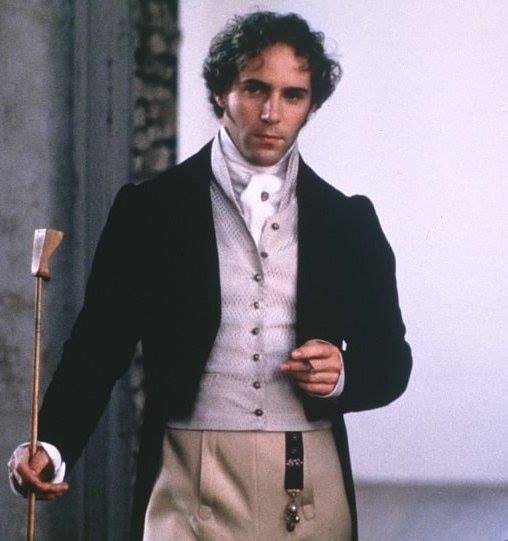
Propaganda:
Mr Elliot :
Henry Crawford:

#round two#hotjaneaustenmenpoll#Mr Elliot#henry crawford#persuasion#persuasion 2022#Mansfield park#Mansfield park 1999
32 notes
·
View notes
Text
The sluttiest most romantic thing a man can do is travel half the country just to visit you in your dreary hometown and personally make sure you’re alright while repeatedly expressing his wish to take care of you forever
#henry crawford#fanny price#jane why oh why did you have to ruin him…..#fanny x henry#mansfield park#jane austen
183 notes
·
View notes
Text
Estimated Sexual Abilities of Austen Men
In no particular order within tier
Edits added in blue based on your reblogs and careful consideration
Top Tier:
Mr. Mainwaring: to have the near undying loyalty of the exceedingly selfish Lady Susan, this man must be a sex god
Henry Crawford: he knows he’s not handsome, he wants women to love him, he'd put in the work. Also one of the only men to be rated by a woman who has had sex before.
Henry Tilney: he cares about things women like, high emotional intelligence, and extremely kind.
Frederick Wentworth: passion and experience (I imagine), also has high emotional intelligence when he’s not being a dufus.
Colonel Brandon: passionate, thinks about other people’s feelings a lot, self-sacrificial
John Knightley: I think there’s a good reason that they keep banging out those kids
Admiral Croft: I cannot believe I left him off, obviously amazing in bed because he respects his wife as his equal and is very fun. You are telling me they spend all their time together and don't have amazing sex? No freaking way!
Good Tier:
William Price: athletic, cares about his sister a lot (good sign), and gives good presents. He’s only nineteen in the story which is why he has room to improve.
Captain Harville: Obviously
Mr. Morland: dude isn’t even on page, but in my head Mrs. Morland enjoyed making all ten of those children.
Colonel Fitzwilliam: I think he’d be good, but not awesome. He'll probably be wasted on a mercenary marriage.
Charles Bingley: I get the feeling he’d be on a race to the end, and maybe not the best communicator at first. Will improve.
Mr. Gardiner: Just because he’s awesome and seems to respect women
Captain Benwick: poetry and passion!
Robert Martin: seems like a pretty romantic guy, also works on a farm so probably athletic.
John Willoughby: Mostly because of experience, but he is also pretty passionate. He’s also super hot, Miss Grey knew what she was getting into. But this guy can only go downhill from here.
Reginald De Courcy: He’s a sweetheart, an occasionally dumb sweetheart
Mr. Bennet: Is he lazy in most domains of life? Yes. But Mrs. Bennet wasn’t just trying for that heir, I’m telling you folks. Maybe he's just trying to make her unable to talk 😉
George Knightley: Promoted to good tier, I do think he's very caring, but he also is always sure HE is right, which may be a problem.
John Yates: Maybe not the most selfless person, but he's got passion and he does love his wife. Probably very into roleplay.
Mediocre but can improve tier:
Fitzwilliam Darcy: he’s a bit stiff... I think it might take some time for him to get good at it (demoted to this tier because he will need time to improve)
Frank Churchill: He’s got passion, but he’s so darn selfish and doesn’t seem to send that much time thinking about Jane’s feelings
Edward Ferrars: I just see him being a nervous wreak the first few times, it’ll get better (Note: I think Lucy is way too smart to have had sex without a wedding date)
James Morland: Dude, I’m just disappointed with you in general. Being led by lust, not protecting your sister. I hope you grow a lot before you try to get engaged again.
Charles Musgrove: could be good, but Mary never seems to appreciate the effort he puts in so he kind of gave up
Tom Bertram: Selfish, never has to try for anything, but he did reform so maybe he can get better here too.
Edmund Bertram: Repressed and selfish. He needs to actually start listening to what women say if he’s going to improve and there is a whole book of him doing exactly the opposite...
Mr. Elton: selfish, full of himself, and low emotional intelligence, however, I think he does love his wife so he is willing to put in some effort for her.
Just bad:
James Rushworth: Maria was not impressed at all, despite how much “taller” he was
Captain Tilney: riding on good looks and money, selfish
John Thorpe: Selfish and he never shuts up. I have trouble imaging him getting a woman to sleep with him without paying her.
George Wickham: selfish and good looking, he’s not doing any work. He thinks you should be honoured to sleep with him.
Robert Ferrars: selfish and not even good looking. There is nothing here. Lucy did not win people.
Mr. Woodhouse: I can’t even imagine, if he didn’t have children I’d say he was a virgin
Mr. Collins: The woman he is trying to please is not his wife.
Mr. Elliot: cruel to his first wife and not even handsome!
Sir Walter Elliot: I don’t think any part of his personality would tend toward being a “giver”, however, if you like mirrors...
John Dashwood: exactly the opposite of a “giver”
Mr. Price: the guy had 11 children in 14 years so I wish I could say he was better in bed. My suspicion is that he started in the good tier and has had a very slow fall into just bad. And all that alcohol, ug...
Dr. Grant: Noted for being a whiney, selfish glutton. Hopefully he just falls asleep before he can attempt anything because I can't imagine him being that good in bed.
General Tilney: If you don't want to even try to imagine their sex life, they go in this tier. And he is so freaking controlling!
No Data: We interviewed Lady Bertram for information on Sir Thomas, but she confessed that with full consent, she has always fallen asleep during sex. Given her personality, we decided that this information has no bearing on Sir Thomas’s abilities. She did say that giving birth was, “Very disagreeable.”
Mr. Hurst: I really can't decide with him because while he does love the finer things in life, we don't know exactly why he and Louisa married. More info required.
Criteria: In the domain of F/M sex, communication is key, so we need a man who is willing to listen to what women say. Also, selfishness is obviously a negative trait when it comes to a happy sexual partner of either gender. Some of this is just vibes, but I think there is a fair amount of canon information about how much men respect women, especially their sisters.
Feel very free to fight me in the reblogs. The only hill I will die on is that Henry Crawford’s rating is correct 😉
#oh the tags#why do i do this to myself?#jane austen#mansfield park#pride and prejudice#sense and sensibility#northanger abbey#persuasion#emma#lady susan#for SCIENCE#mr. darcy#charles bingley#mr. mainwaring#henry crawford#henry tilney#edward ferrars#colonel brandon#captain wentworth#austen heroes#catherine and henry tilney are totally having like 10 kids#it needed to be done
976 notes
·
View notes
Text
No sooner had Susan and her cousins left their box at the intermission than they came face to face with Miss Crawford and a gentleman exiting another box a few doors down. The gentleman was a stranger to Susan but the similarity of his appearance to the lady was such as made his identity as obvious as it was unanticipated.
Julia stopped dead and even Miss Crawford, usually so self-possessed, blushed and hesitated. Her brother too seemed struck by astonishment at the sight of the party. Only Mr. Yates, whose happy disposition did not admit of any embarrassment, was unperturbed.
“Crawford!” he boomed. “This is capital! No idea you were in the country, let alone in town! It's been years! But of course we should meet at the theatre - where else? You remember my wife, of course? And this is her cousin, Miss Price. Susan, this is the famous Mr. Crawford.”
Susan was as surprised as the others but for different reasons. This was the infamous Mr. Crawford? Her cousin had ruined herself and plunged her family into disgrace for him? Why, he was such a short and slight man! Susan was on the taller side of average for her sex but she was nevertheless unaccustomed to stand eye to eye with a man in the way she was able to with Mr. Crawford. And those expressive, dark features - so elegant and pretty on his sister - were not so attractive on the gentleman. He cut an insignificant sort of figure, especially when put next to the broad bulk of Mr. Yates, who loomed over them all in his usual way. She had only met him briefly many years ago but he had seemed taller and more impressive in her memory.
What was she to say to him? She did not desire an introduction; indeed, Yates probably ought not to have done it. She could not see Julia’s expression but her silence was speech enough. Perhaps she could cut him, she could give him the cut direct and walk straight past him with her head held high and Fanny in her heart… except of course that she did not dare.
In the event, he was the first to speak. The awkwardness and evident embarrassment of his address as well as its obvious insincerity as he reacquainted himself with Mrs. Yates and professed a delight to meet Miss Price gave Susan the courage to respond with a clear and direct look, “How do you do, Mr. Crawford? But we have met before in Portsmouth five years ago; perhaps you do not recall.”
Surprise crossed his face. “I do recall our meeting. How could I forget?”
How indeed? Later, she would think of many retorts, albeit none of them suitable to be spoken aloud. Instead she found herself asking if was enjoying the play.
“With reservations,” he replied, his gaze never straying from hers. “And yourself, Miss Price?”
“Tolerably,” said Susan at the same time as Mr. Yates jumped in to inform them that this was Miss Price’s first ever visit to the theatre and how important it was that it was to such a wonderful production as The Distress’d Mother and had they ever seen anything so touching as Andromache’s tragic devotion?
“I find her a little too pious for my own taste,” interjected Miss Crawford. “I find myself drawn to Hermione and I cannot feel ashamed of it. But you have a very fine performance in Orestes for your first play, Miss Price. You have chosen well.”
Susan acknowledged that it was so and that she was very much looking forward to seeing him go mad in the final act. Yates declared there was no better actor anywhere in Europe and seemed on the point of anticipating the mad scene itself in the corridor when Julia finally roused herself to insist that the performance must be starting soon and hurried Susan back into the box, leaving the Crawfords behind to make of Mr. Yates’ paroxysms of dramatic enthusiasm what they would.
As for Susan, her spirit was disturbed by the meeting but she was determined that Mr. Crawford should not have any power over her - he had done quite enough damage by the Bertrams already for her to wish to give him any further satisfaction. Her attention should be devoted solely to the progress of the drama on stage before her. Nevertheless, it was strange to think that such a man should have been so captivating to both her cousins - he was not even handsome! And his address, well, there was nothing extraordinary about it. She could not understand it at all. And as for his view of the play, she could not help wondering over his reservations. What a very curious way to respond to her question which she had only asked out of politeness! Really, if he had reservations, he should at the least have said what they were! And so it was that at the end of several hours, when the play finally drew to a close, mad scene and all, having vowed that Mr. Crawford’s name should not even cross her mind, she found to her consternation she had thought of little else.
#the second miss price#rose writes#mansfield park#fanfiction#susan price#henry crawford#mary crawford#john yates#julia bertram
24 notes
·
View notes
Text
The Crawford Family Album: Volume XVII
On to a family that I suspect might be a favourite for some - the Crawfords.

Oldest girl Estella is quite grown up these days.
~ Gemini 7 / 7 / 4 / 9 / 8
~ Excitable / Over-emotional / Bot-Fan
~ OTH: Cuisine
~ Favourite Colour(s): Yellow / Turquoise

She would like her grandfather Henry to know that she's definitely his best grandchild!

She's completely adorable...

...and charming...

...and terrific with her younger siblings. What more could any grandparent want?

The family has also recently celebrated Octavius's first birthday.
~ Gemini 0 / 6 / 6 / 6 / 9
~ Born Performer / Loves the Outdoors
~ OTH: Music & Dance

He's an absolute cutie too!

We mustn't neglect the grown-ups though. It was finally time to grant Frances and Green Bean's longstanding wish, to get married.
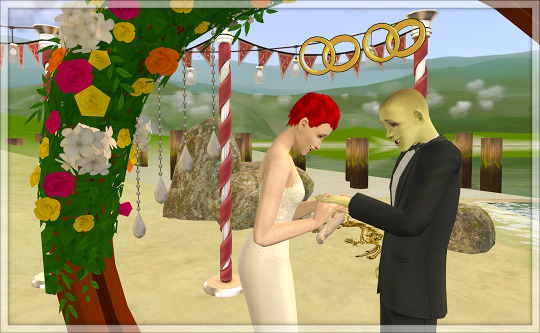
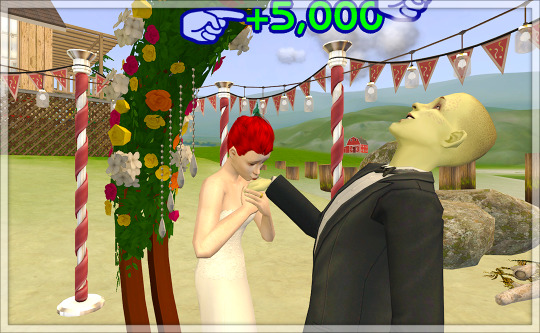
It just had to be a beach wedding, taking advantage of the fine autumn weather.
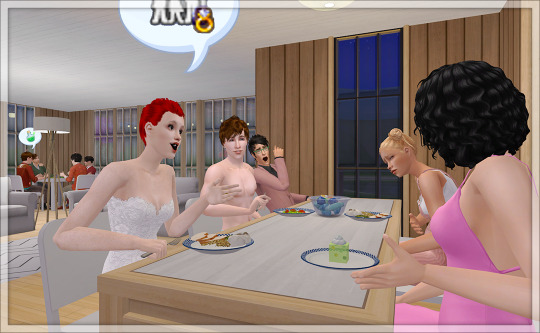
There was a lively gathering of family and friends after the ceremony.

But there are still potties to be emptied, even if you are in your wedding dress.

Wedding guest Bennet kindly took charge of vermin control though.
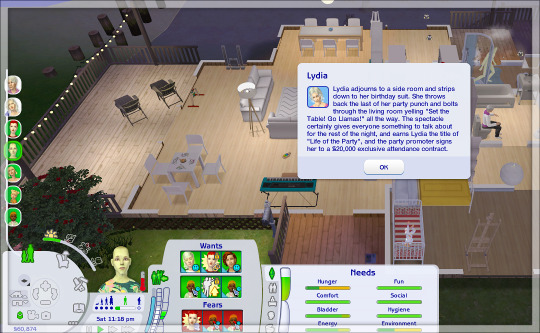
And then there's Lydia. This is just SO her.
#sims 2#gameplay#merybury#henry crawford#lydia bennet#frances crawford#green bean#estella green#octavius green#bennet tilney#crawford family
21 notes
·
View notes
Text
The thing that drives me crazy about Henry Crawford is that he almost made it. He almost changed. A bit more restraint, a little more core morality, and his life could’ve been so different. Everything could’ve been so different.
#it’s like. you’re reading about his infatuation with Fanny and you almost want to root for him!!#he sees her the way none of the others have!!!#and yet !!!!#he was lacking in the most important respects#something about how. he might have everything that Edmund doesn’t but Edmund has morals. and THAT is Henry’s undoing#because if Fanny hadn’t already been in love with Edmund she really could’ve been taken in#knowing a decent man before knowing Henry saved her#idk where i’m going with this#ignore me#elly's posts#mansfield park#henry crawford
20 notes
·
View notes
Text
Henry and Mary Crawford walked so Ryan and Sharpay Evans could run
#jane austen#classic lit#classic lit meme#classic literature#jane austen meme#mansfield park#henry crawford#mary crawford
36 notes
·
View notes
Text
Mansfield Park (1999) might be a fairly dated and inaccurate Austen adaptation, but Henry Crawford is literally the hottest man on this planet
#mansfield park#Mansfield Park#Jane Austen#austen adaptations#fanny price#henry crawford#english literature#pride and prejudice#sense and sensibility#emma#persuasion#northanger abbey#also why does edmund look so ugly#he looks like he plays rugby#or like oliver wood with sideburns#also henry crawford looks like enjolras that's probably why i think he's hot
43 notes
·
View notes